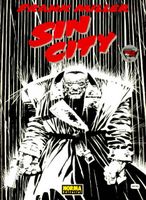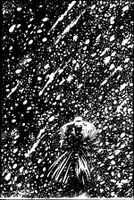The stories worked best when a sense of reality seeped in, most notably in the earliest storylines featuring Marv. Frank Miller later got carried away, allowing more fanciful and fetishistic superhero-type characters (ninja hookers, bright-yellow bad guys) to overtake the simulated veracity of his noir world.


But telling wholly original tales was never the point of "Sin City." Instead, Miller seemed to be looking for a strong vehicle to showcase the breathtaking new black-and-white drawing style he'd developed. His relief work -- pitch-black backgrounds splashed and splattered with abstract white patterns that upon closer inspection coalesce into recognizable characters momentarily suspended in time -- is especially stunning.
The stories in "Sin City" are thrilling enough, however, to inspire a number of movies or a serialized TV show. A subtle writer and a director with realistic-tendencies could have developed the plots and characters into fully realized forms onscreen, while the escapist plots and snarky dialogue would surely have pleased a large audience.
Robert Rodriguez is not a man of subtlety or realism, but he showed great courage and a lack of ego in allowing Frank Miller the opportunity to write and direct alongside him. With that in mind, one cannot deny the brilliance with which Miller and Rodriguez played up their strengths in adapting "Sin City" into a feature film.


Re-creating the ineffable "Sin City" artwork is impossible, but the close visual approximation that Rodriguez was able to maintain through cinemagraphic and FX acumen is astounding. Regrettably, "Sin City" the movie also serves to highlight all the weaknesses and flaws found in the often two-dimensional, sometimes cheesy (but always sinfully lovable) "Sin City" comic books, but it's successful attempt at being absolutely true to its source material is a triumph.
Yes, a more mature and nuanced filmmaker-writer team might have created a better film from the "Sin City" comics (but perhaps nothing as visually and pedantically loyal to its source); and one can certainly argue that movies should aspire to be more than adaptations of comic books or regurgitations of old crime/detective/noir story ideas (or revamps of old movies, foreign movies, and expired TV shows, for that matter); and comic-book purists such as Alan Moore would say that stories told as sequential art should stay in print and not be abused as movie fodder.
And Rodriguez -- a brilliant cinematographer (even when shooting DV) and an expert at creating fast-paced adventure -- has a tone-deaf writing style and a lackluster ability for pulling believable performances from actors. "Once Upon a Time in Mexico" suffered from the same flaws and highlights as "Sin City": flashes of brilliance and eccentricity and excitement tempered absurdity, plot holes, and groan-worthy camp; extreme violence with no emotional heft or impact; daring experimentation undercut by a complete ridiculousness.
Then again, no other filmmaker alive today is as capable of consistently and regularly bringing their entirely realized and uncompromised cinematic vision to the screen, reaching a large audience, and making money while not bowing to studio pressure, union pressure, or a politically conservative society. And no other filmmaker is making films that look or feel like Rodriguez’s films. He is an iconoclast, and in this day and age of constant remakes and sequels and church-marketed, product-tested, megaconglomerate cinema, that has to be appreciated and applauded -- even if his films do fall far short of perfection, even if they do too often immerse themselves in a juvenile mentality, even if they aren’t everything we hope for from the new vanguard of Hollywood.


Plus, as a longtime reader of “Sin City,” I can’t help but marvel at the perfection of the film’s casting—I’d long dreamed of bringing Mickey Rourke back from the depths and casting him as Marv in a “Sin City” film, so Rodriguez read my mind in that regard. And it was nice to see that Rodriguez didn’t shy away from violence and nudity, happily accepting an R rating despite the studios’ current loathing of anything that will keep kids from being able to buy tickets. With “Sin City,” Rodriguez shows Hollywood that audiences will still queue up for a bit of T&A and blood, just like in the good ol’ days of Roger Corman and Adrian Lyne. Perhaps this will open a door for better films from other filmmakers that have found themselves trapped in studio-mandated PG13 hell.
My only complaint with the T&A in “Sin City” is Jessica Alba being cast to play a stripper even though she doesn’t do nude scenes. Like lovely Natalie Portman in Mike Nichols’ “Closer” and Salma Hayek in Rodriguez’s “From Dusk Till Dawn,” Alba gives strippers everywhere a bad name with her chaste and clothed portrayal an exotic dancer. Having a no-nudity clause is respectable, and having a nude-free movie is fine, but don’t play a stripper if you refuse to show the goods, I say.
All in all, “Sin City” functions incredibly well for what it is, but until Rodriguez begins working with a more grounded writer, pays more attention to the performances of his actors, and tones down the theatrics just a tad, he’ll never become the Sam Peckinpah he has the potential to be.
****
Frank Miller’s Greatest Hits: “Batman: The Dark Knight Returns” (and the rest of Miller’s Batman work), the Martha Washington sci-fi series (starting with “Give Me Liberty,” drawn by Dave “Watchmen” Gibbons), “Ronin” (one of my personal favorites), “300” (a historical epic), various Daredevil and Elektra tales, and “Hard Boiled” and “Big Guy and Rusty the Boy Robot” (both with art by the incomparable Geoff Darrow). For more, visit The Complete Works of Frank Miller.
****
If you liked "Sin City," don't miss maestro David Cronenberg's celluloid adaptation of the lesser-known graphic novel "A History of Violence." (The comic was written by John Wagner and drawn by Vince Locke.)
***
Sinful Art: Not at all safe for work, but a pretty funny and damn near mesmerizing look at what's underneath it all .... Scroll over the ladies to see the goods and click on the figures to see their back sides ... This is naked art, people, not porn -- Mise à nu (2005, Reynald Drouhin). From those fine folks at Incident.net.



